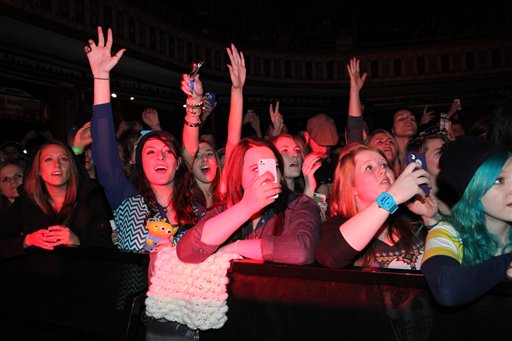Picture or it didn’t happen
By Leah Pickett
File: Fans at an Ellie Goulding concert use cell phones to capture the event. AP/File
1
/ 2

File: Fans at an Ellie Goulding concert use cell phones to capture the event. AP/File
1
/ 2
Picture or it didn’t happen
By Leah Pickett
WBEZ brings you fact-based news and information.
Sign up for our newsletters
to stay up to date on the stories that matter.

“Please do not watch the show through a screen on your smart device/camera,” the sign reads, “PUT THAT [BLEEP] AWAY as a courtesy to the people behind you and to Nick, Karen and Brian.”
Understandably, the band has a zero tolerance policy for looking out at the audience and seeing a constellation of iPhones glowing back at them.
I will be the first to admit that I’ve been guilty of this behavior. I’ve snapped photos during shows for St. Vincent and Ty Segall, compelled to somehow immortalize the experience of seeing my musical idols in the flesh. I’ve also developed a fondness for photo-sharing other aspects of my life, like the best cocktail I’ve ever tasted or a new book that I can’t wait to read. And I’m not alone in what appears to be a millennial-specific compulsion to photo-document even the tiniest minutiae, as the mobile app Instagram just topped 100 million monthly users this year.
My generation came of age with Facebook, then mobile photo-sharing on a mass scale. We’ve become a society of instant clickers, wracked with extreme anxiety when parted from our electronic devices and a constant needling desire to prove our worth through social media. We ask ourselves, “If I don’t take a picture of this event, will my friends believe that I was there?” With the rise of tech addiction and smartphone cameras literally right at our fingertips, the answer to that question is usually no.
The papal conclave on March 12 was a glaring example of this phenomemon. Past popes (including Pope Benedict XVI in 2005) have been greeted with a smattering of camera flashes; but when the newly-elected Pope Francis appeared on the balcony of St. Peter’s Basilica, almost everyone in the crowd raised their glittering smartphones and tablets in response.
As the world’s obsession with technology grows, so does our reliance on instant gratification and the gnawing impulse to photo-capture every moment. Facebook, Twitter and now Instagram have made oversharing easier than ever before, and “keeping up with the Joneses” through social media even more stressful.
According to the Pew study of millennials, 40 percent of young people surveyed feel like they “can’t live” without their smartphones. However, our parents did just fine without them, and perhaps had even better memories of their good times as a result of being 100 percent unplugged.
Can you imagine the Beatles playing to a sea of iPhones, or a Woodstock audience glued to their Twitter feeds? Back then, concert-goers could experience music in the moment, allowing the songs to wash over them completely, and never once think about which Instagram filter they should use to prove how cool they were for being there.
To the compulsive photo-sharers: cutting back is key. Take one quick shot if you absolutely must, then sit back and enjoy whatever experience that you’re supposed to be having. Pictures may last forever, but real-life moments are gone in a flash; so try really living them for a change, without the superficial barrier of your camera phone getting in the way.
Leah Pickett writes about popular culture for WBEZ. Follow her on Twitter @leahkpickett.
